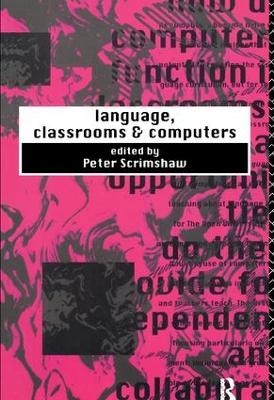
Language, Classrooms and Computers
Seiten
2017
Routledge (Verlag)
978-1-138-41118-0 (ISBN)
Routledge (Verlag)
978-1-138-41118-0 (ISBN)
The contributors use teachers' accounts together with their own research to examine how the use of computers in school can affect the ways in which children learn and teachers teach.
As computers become more widely used in schools, it is clear that they have the potential not just to support the achievement of conventional goals, but also to redefine what we mean by reading, writing and discussion. The contributors to Language, Classroom and Computers - all with experience of teaching about language and computers for The Open University - use teachers' accounts together with their own research to examine how the use of computers in school can affect the ways in which children learn and teachers teach. The first section looks at some generic aspects of computer use, focusing particularly on class management: individual and group learning, the role of the teacher as facilitator and co-learner and the problems of limited access. The second section examines the contribution of specific sorts of software package: word processing, e-mail, hypertext and so on to lanugage learning. This is a book for everyone who wants IT to add a new dimension to their teaching.
As computers become more widely used in schools, it is clear that they have the potential not just to support the achievement of conventional goals, but also to redefine what we mean by reading, writing and discussion. The contributors to Language, Classroom and Computers - all with experience of teaching about language and computers for The Open University - use teachers' accounts together with their own research to examine how the use of computers in school can affect the ways in which children learn and teachers teach. The first section looks at some generic aspects of computer use, focusing particularly on class management: individual and group learning, the role of the teacher as facilitator and co-learner and the problems of limited access. The second section examines the contribution of specific sorts of software package: word processing, e-mail, hypertext and so on to lanugage learning. This is a book for everyone who wants IT to add a new dimension to their teaching.
Peter Scrimshaw is Lecturer in Education at the Centre for Language and Communications, the Open University.
Part I: Computers in context 1 Teachers, learners and computers 2 Theories of learning and information technology 3 Computer-based activities in classroom contexts 4 Collaborative learning with computers 5 The teacher’s role 6 Access to learning: problems and policies Part II: Computers and language development 7 Software: an underestimated variable? 8 Cooperative writing with computers 9 Communicating through computers in the classroom 10 Text completion programs 11 Computer-based approaches to second language learning 12 Reading, writing and hypertext 13 Researching the electronic classroom
| Erscheinungsdatum | 07.08.2017 |
|---|---|
| Verlagsort | London |
| Sprache | englisch |
| Maße | 156 x 234 mm |
| Gewicht | 453 g |
| Themenwelt | Geisteswissenschaften ► Sprach- / Literaturwissenschaft ► Sprachwissenschaft |
| Mathematik / Informatik ► Informatik ► Theorie / Studium | |
| Sozialwissenschaften ► Pädagogik | |
| ISBN-10 | 1-138-41118-3 / 1138411183 |
| ISBN-13 | 978-1-138-41118-0 / 9781138411180 |
| Zustand | Neuware |
| Haben Sie eine Frage zum Produkt? |
Mehr entdecken
aus dem Bereich
aus dem Bereich
Das umfassende Standardwerk auf der Grundlage der aktuellen amtlichen …
Buch | Hardcover (2024)
Duden (Cornelsen Verlag)
CHF 48,95


